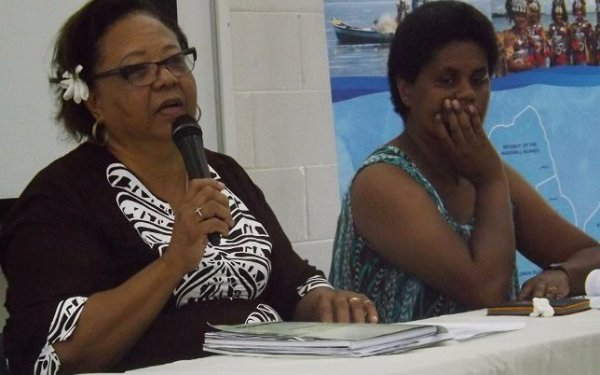The theme of the 48th Pacific Islands Forum was the Blue Pacific, emphasising that the Pacific is repositioning itself as the Blue or Ocean Continent (or the Big Ocean States), rather than the Small Island States.
The aim of this reframing is to counter perceptions that the region is small and lacks power. The effects of such a perception have also been experienced by Pacific regional civil society, which has in the past been excluded from Pacific Leaders dialogue.
I have been watching the Forum and its lead up with interest, as a researcher focused on the amplification of different voices through coalition-building in Pacific civil society.
In the past, civil society in the Pacific has fought hard to gain a seat at the table in order to have their concerns heard at the highest level. The tide appears to be turning this year, with civil society leaders calling on Forum leaders to include the voices of the grassroots organisations in their deliberations.
Having a regional space and keeping it open
My ongoing doctoral research on Pacific feminist civil society suggests that Pacific feminists are constantly working towards creating new spaces and building a network of alliances and coalitions in order to amplify the voices of civil society regionally, with a view to countering the increasing closure of civil society spaces at the global level.
Pacific feminists are constantly working towards creating new spaces and building a network of alliances and coalitions in order to amplify the voices of civil society.
Female leaders of civil society organisations had opportunities to meet with the Pacific Islands Forum Secretariat in the lead up to the meeting, as part of an ongoing dialogue that has sought to strengthen relationships between the Forum Secretary-General and women’s groups in the region.

Sarah Thomas-Nededog, President of Pacific Islands Association of Non-Government Organisations (L) Photo: Tipi Autagavaia
As described in the Vanuatu media recently, this dialogue:
‘… aimed to develop mutual understanding on key issues and challenges in efforts to achieve gender equality and advance the rights of women and girls in the Pacific. It also aimed to identify strategic and practical actions to assist these efforts, including through regional mechanisms and organisations’.
My interviews with various key stakeholders in and around regional civil society has confirmed that while engagement has been poor in the past, opportunities are increasing. The new structure enabling civil society engagement was seen as particularly valuable, with transparency and accountability as the key measures. Other suggestions included extending the funding for civil society engagement, and making sure that these inclusions become a permanent part of the system.
A long way from inclusion to influence
The hopes associated with this inclusion will also involve observing the evidence of a concrete impact. Civil society will hold formal authorities accountable for their promises in pre-Forum dialogue.
A review of the Pacific Islands Forum Leaders Meeting outcome statement gives a clear idea whether the leaders are listening to civil society actors and organisations.
In that statement, Forum Leaders affirmed they ‘recognised the value of dialogue processes’ with these organisations to inform the Leaders meeting. They also agreed that robust engagement with all stakeholders would be central to the upcoming COP23 climate change conference in Fiji.
These developments show that advocacy by Pacific feminist civil society for the right to have a voice at the regional level is finding a platform at Pacific regional institutions. This year, more media coverage has been given to the importance of diverse women’s civil society participation in the Pacific Islands Forum than in prior years.
Advocacy by Pacific feminist civil society for the right to have a voice at the regional level is finding a platform at Pacific regional institutions.
For example the Vanuatu media reported that ‘participants acknowledged the increased momentum and activity of women’s civil society organisations and their contributions at the international, regional and national level.’
The reclaiming of power as a Big Ocean Continent for climate change advocacy by Pacific Leaders is also allowing for Pacific feminist civil society to be heard. As the Forum Deputy Secretary-General recently said:
The voices of those most vulnerable with limited opportunity to be heard will be heard through you. Your voices count and they should continue to be heard – Participation is power. If we remain on the sidelines and keep quiet, we may be overlooked by stronger voices that deviate and distract attention away from us.
The importance of ensuring a genuine dialogue between civil society and formal institutions cannot be emphasised enough. In the case of the Pacific region, civil society dialogue at regional level is particularly important because it ensures that space is given to representatives of grassroots women at meetings where policy and decisions are being made that affect their lives directly.
What remains to be seen is if formal institutions and leaders listen to these expressed views, take them into account, and allow them to inform concrete action. The price of peace is, after all, eternal vigilance.
Dr Jane Alver is a Senior Research Fellow in the Faculty of Business Government and Law at the University of Canberra. Her research area is civil society activism for gender equality.





